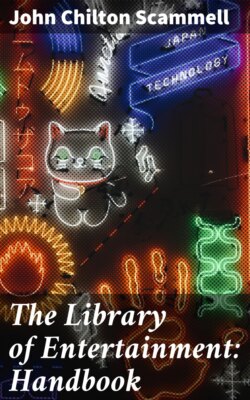Читать книгу The Library of Entertainment: Handbook - John Chilton Scammell - Страница 8
На сайте Литреса книга снята с продажи.
ОглавлениеPART II
Table of Contents
THE STUDY OF LITERATURE
Table of Contents
We are told there is no royal road to learning; no short cut to the understanding and appreciation of literature. We are told that we must admire Homer, or Addison, or some other immortal author, but no one tells us why or how. No explanation is given of the reason why their work is deservedly immortal. Our schools do not introduce us to the delights of good reading; instead, they handle a few stories and essays as if they were Latin or algebra, making drudgery out of what ought to be enjoyment. The result is that we are frightened away from the great writers; their work is supposed to be a mystery, only to be revealed to those who give years of labor to its study.
But no one is so dull or so heedless of pleasure as not to accept the means of lasting delight when it is put right in front of them. Thousands of people are waiting for the chance to get in touch with the good sense, rousing style, and splendid ideas of the masters of literature. That is why this volume has been prepared. It furnishes a direct and attractive road straight to the heart of literature. It has been laid out systematically so as to be a simple and practical guide.
The leading characteristics of each era, each nation, and each division of literature have been tersely stated, with the authors under each of these classifications listed beneath. The noblest and most fascinating works gain tenfold in interest through the knowledge of these fundamental facts. With them before you, you command a view, not merely of one single author, but of the whole movement of which he was a part. You see the ideas and lines of thought from which a book has sprung, the hidden forces which went into the making of it. Each book stands in association with those of the same literary class, or nation, or period; their relationship with the rest of literature is at once apparent. In this way the wasteful drudgery and folly of aimless reading is avoided. The study of literature pursued with the means here given cannot be tedious, for it is straightforward, simple, and clear.
The results that are to be expected from the limited time which most of us can devote to reading are more extensive than might be thought. In this connection read the following selections, practical and full of common sense, each of them throwing light on the subject of reading.
The Preface, I, 3.
Hamerton, "To a Man of Business," VI, 236.
Harrison, from "The Choice of Books," VI, 275.
Morley, "Popular Culture," IX, 236.
Schopenhauer, "On Books and Reading," X, 374.
